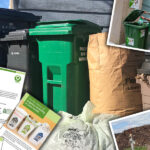
Kate Bailey
BioCycle May/June 2019
The marriage between the plastics industry and the recycling industry has never been a happy one. Arranged marriages hardly ever are. And was it ever really a marriage or even a partnership? It takes two to be in a successful relationship, but it hasn’t really felt like we’ve ever been working as a team.
Let’s recap the past few decades: You designed products that we couldn’t recycle without talking first about how we could make it work. Then, you threw the recycling symbol on there and let us deal with all the confused and frustrated consumers. You fought us when we asked you to use more recycled content and to buy back your products. You lobbied against proven strategies like bottle bills and extended producer responsibility polices to increase collection efficiencies. You put marketing gimmicks like shrink sleeves above recycling quality, every … single … time. Now, as we should have expected, you have found someone else, the solution to your problems — the younger, sexier model of us you call “chemical recycling.” Put it all together and it’s not a surprise that our partnership is unfolding.
Admittedly, relationships are hard work, and I’m sure the plastics industry has a few grievances it would like to air as well. However, as recyclers, we know that our relationship doesn’t have to be this way. We partner much more collaboratively with other industries like glass, steel, aluminum and cartons, which have all treated recycling with respect and actively worked with us to create end markets for their materials.
What Will It Take To Save Our Relationship?
I’ll admit, as a recycler, we can be faulted for being too optimistic. After all, we set out to do nothing short of “save the planet” and still keep trying every day. We weather bad markets brought on by China, low oil prices, trade tariffs, etc., but we keep truckin’ because we believe recycling is the foundation of a regenerative circular economy that sustains both people and our planet. But the mounting problems with plastics have pushed our limits too far. This partnership can’t be saved unless you make some serious changes. Here’s where we need to start:
-
- •
Replace Nos. 3, 6 or 7 plastics
-
- with more recyclable, less toxic resins. There are no viable, long-term markets for these materials, now or realistically on the horizon. The changes need to start with product design.
• Phase out avoidable, single-use plastics most likely to cause marine litter. The European Union just banned 10 single-use plastics. Stop making them globally.
• Buy back your products and increase recycled content. The Recycle Demand Champions initiative is a good move in that direction, but we need to think bigger, bolder and faster. Unilever committed to 50 percent post-consumer recycled content in its North American packaging by the end of this year. Let’s take that industry-wide and keep growing.
• Recommit on collecting Nos. 1 and 2 bottles. We need a real commitment to use more recycled content, build more U.S. remanufacturing facilities and support programs that collect materials. Invest in bottle-to-bottle recycling, not chemical recycling.
• Scale up polypropylene (PP) market development and more collection programs for No. 5 plastics, such as yogurt cups. PP is a relatively safe plastic and a good alternative to less recyclable, more toxic resins.
• Stop concentrating on chemical recycling as the magical technical solution. These low-value plastics cannot be sustained. It’s not a full-scale solution, it’s a distraction.
• Invest substantially in reusable packaging as a business model. Projects such as Loop that use refillable, reusable containers are a game changer. We need innovative solutions that reject disposable as the default.
Lastly, a public apology would go a long way. Our reputation in the recycling industry is suffering with headlines like “Is This the End of Recycling?” in major news outlets because China is no longer accepting plastics for recycling. The recycling industry has our fair share of blame on this market collapse, but meanwhile the plastics industry has been silently standing on the sideline, letting us take all the blame.
Partnerships are hard work, and we don’t take the subject of divorce lightly. Plastic has brought tremendous benefits and innovations over the past 50 years. But the damages are mounting, and the recycling industry can no longer stand by as your scapegoat as you poison our planet. The bottom line is that the plastics industry makes products that no one, not even you, wants to buy back for recycling. The recycling industry can’t change this — only you can.
Kate Bailey is the policy and research director for Eco-Cycle and helps citizens, government staff and elected officials implement zero waste solutions. This article was originally published on www.waste360.com













